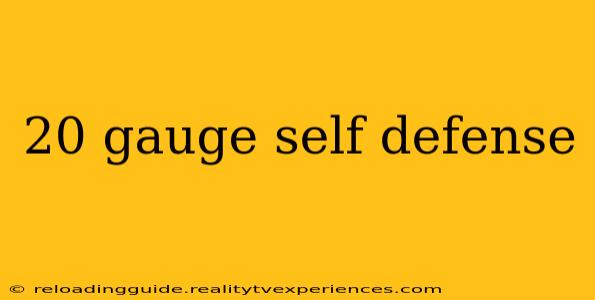Choosing a firearm for self-defense is a deeply personal decision, requiring careful consideration of various factors. While many gravitate towards larger calibers, the 20-gauge shotgun deserves a closer look. This comprehensive guide explores the 20-gauge's suitability for self-defense, weighing its advantages and disadvantages against other popular options.
Advantages of a 20 Gauge for Self-Defense
The 20-gauge shotgun offers a compelling combination of features that make it a viable, and for some, preferable, self-defense option.
1. Reduced Recoil: Easier to Handle for Smaller Users
One significant advantage of the 20-gauge is its manageable recoil. Compared to the heavier 12-gauge, the lighter recoil makes it significantly easier to handle, particularly for individuals with less upper body strength, smaller stature, or those new to firearms. This reduced recoil translates to faster follow-up shots, crucial in a self-defense situation.
2. Lighter Weight: Increased Mobility and Maneuverability
The reduced weight of a 20-gauge shotgun contributes to enhanced mobility. Carrying a lighter firearm for extended periods is less tiring, allowing for greater maneuverability and a quicker response time in a threat scenario. This is particularly important in a home defense context where navigating tight spaces and obstacles is common.
3. Less Noise and Muzzle Flash: Improved Situational Awareness
While not drastically different, the 20-gauge generally produces less noise and muzzle flash than a 12-gauge. This can be advantageous in close-quarters situations, preserving your hearing and minimizing temporary vision impairment, thus improving your situational awareness during the critical moments of a self-defense incident.
4. Wide Range of Ammunition Options: Versatility for Different Needs
The 20-gauge offers a decent selection of ammunition types, including buckshot, slugs, and birdshot. This versatility allows you to choose the appropriate round for your specific self-defense needs, considering factors like the potential engagement distance and the environment. However, the ammunition selection may be slightly less extensive than that available for the 12-gauge.
Disadvantages of a 20 Gauge for Self-Defense
While the 20-gauge offers several benefits, it's essential to acknowledge its limitations.
1. Less Stopping Power Compared to 12 Gauge: Potential for Follow-Up Shots Needed
The 20-gauge generally delivers less stopping power than the 12-gauge. This means that accurate shot placement and potentially multiple shots may be necessary to neutralize a threat. While manageable recoil is advantageous, the trade-off in stopping power necessitates more precise marksmanship.
2. Limited Ammunition Capacity: Requires Faster Reloading or Multiple Firearms
Some 20-gauge shotguns have a lower ammunition capacity than comparable 12-gauge models. This requires faster reloading or consideration of carrying a second firearm for increased defensive capacity.
3. Potential for Reduced Penetration: Consider Your Environment and Target
Depending on the ammunition used, the 20-gauge might exhibit reduced penetration compared to the 12-gauge. While this might be beneficial in densely populated areas to avoid over-penetration, it's crucial to consider the potential threat and your immediate surroundings when choosing ammunition.
Conclusion: Is a 20 Gauge Right for You?
The 20-gauge shotgun presents a viable self-defense option, especially for individuals who prioritize reduced recoil, lighter weight, and manageable noise. However, its reduced stopping power compared to the 12-gauge is a critical factor to weigh. Ultimately, the best choice depends on individual needs, physical capabilities, and training. Thorough firearm safety training and practice are essential regardless of the chosen caliber. Consult with a firearms expert and undergo professional training before making your decision. Remember, responsible firearm ownership is paramount.

